- Home
- Justin Bell
Dark Cloud_Thrilling Post-Apocalyptic Survival Series Page 2
Dark Cloud_Thrilling Post-Apocalyptic Survival Series Read online
Page 2
Winnie slapped him on the arm and rolled her eyes.
“Lemme guess,” he continued, “biggest thing you’re upset about is no more pumpkin spice latte. Am I right?”
“Shut up, jerk,” Winnie said. Though just the mention of a pumpkin spice latte made her stomach grumble with white-hot flare of desire. She didn’t even really like coffee that much, but for some reason the idea that she couldn’t have it suddenly made it the most desirable thing ever.
“My bad, my bad,” Tamar said. “Seriously, though. Where you come from? I can’t remember if you ever told me.”
“Denver,” Winnie replied, gazing out the window. “Well, just outside it anyway.”
“It got nuked?”
Winnie shook her head. “Not directly, but Utah did. Bad enough that Colorado is likely a lost cause. Someone was saying that everything west of the Rocky Mountains is now pretty much a nuclear wasteland.”
“Dang.”
“How did we even get here?”
The van continued on in silence, the two kids glancing out the front windshield. Rebecca leaned back in the seat next to Tamar, her eyes closed, but likely not sleeping.
“Well, no matter how we got here,” Tamar said quietly, then turned and looked at Winnie, “I’m glad I ended up in here. You know, hanging with you.”
Winnie brushed a lock of hair away from her face, her cheeks flushed. “Yeah. Me, too.”
“Why don’t you kiss him already?” Max hissed from the seat behind them, leaning forward into his sister’s ear.
“Mind your own business, turdball!” Winnie barked back and her brother withdrew, dropping against the seat back, laughing. Brad sat next to him with Rhonda on the other side of Brad, and Max’s mother looked over at him with that trademark mom look that told him he needed to knock it off.
“Sorry, Mom,” Max said quietly.
Brad continued staring forward, seemingly unfazed by the whole exchange. His eyes were settled on the passenger seat where Greer lay. Bradley didn’t know why, but just looking at the back of the seat and thinking of Clancy Greer lying there caused a deep sadness to press down on him, a fresh and raw sadness that seemed to drown out his previous emotions. Left shattered and a shell of his vibrant eleven-year-old self after the brutal death of his parents, Brad had very much withdrawn after looking the proverbial monster in the mouth and letting it swallow him. This new emotion was more than just a lead brick that sat in his chest, the feeling was a sense of impending doom and hopelessness. An innate certainty that life existed to punish him and the state Greer was in was just another example of the unfairness of it all.
The utter pointlessness.
They had to get Greer to a hospital. There was simply no other acceptable outcome. He’d become a surrogate of sorts for Brad, latching onto him after his parents’ deaths and they’d formed a bond, almost like an adoptive grandfather. If Greer died it would just be one more example of the futility of forging bonds, bonds that were simply destined to be broken, usually against a backdrop of violence.
“You alright, Brad?” Max asked. “You just keep staring up out the window.”
“Yeah, I’m straight,” Brad replied.
“Straight? Man, you’ve been hanging with Tamar too much.”
“Say what?” Brad asked. “You’re the one that wants to be his little best friend, Max, not me.” The two boys chuckled, though Max sensed a sharp edge in Brad’s voice, a narrow needle point of bitter truth buried within the haystack of his humor.
They sat quiet for a few moments, until Max struck up conversation again. “So what do you think Philly’s like? It’s pretty close to the northeast, you think they’ve got power there?”
Brad shrugged. “Maybe? Seems like if they’re diverting all these shipments, there must be a reason for it. That’s as good a reason as any I guess.”
“You think they have Internet?”
“Probably not,” Brad replied. “If they do, though, we should play some Madden. Been a while since I kicked your butt at X-Box.”
“Oh is that how it is?” Max asked. He stopped talking for a moment as if some grand thought just occurred to him. “Wait,” he continued. “You think John Elway’s still alive somewhere?”
Brad drew in a breath. “Dang, man, I don’t know.”
“What about Von Miller? Demaryius Thomas?”
“All those rich athletes?” Brad asked. “You’re worried about the Denver Broncos, seriously?”
“Well, yeah. They’re building for another Super Bowl, man. All they need is a quarterback.”
Brad shook his head. “NFL is done, Max. It’s not coming back. But I tell you all those millionaire high society guys, they probably all have super luxury bomb shelters or something. They’re fine. It’s only us losers that are fighting for our lives.”
“Yeah you’re probably right,” Max replied. “Hey, at least we beat Tom Brady one last time before the end.”
“You’re so weird.”
Angel chuckled in the way back of the van, listening to the boys talking. It felt refreshing to hear an argument about sports amidst everything else going on, even if it was an argument about whether or not Max’s favorite football team was still alive.
“I’ve always been a Raiders guy myself,” Angel said quietly.
“Raiders?” Max laughed, whirling around. “Get out. You’re walking to Philly!”
The ex-convict chuckled as he turned and looked out the rear window, making sure they weren’t being followed. Behind the van, the road stretched out, wide, dark, and quiet, with no sign of other vehicles or pursuers. Maybe Ironclad really was down and out.
Somehow, he doubted it.
Leaning his head against the window, his tired eyes threatened to press closed, the familiar dull ache of exhaustion crawling around inside his head. It was a feeling he was accustomed to, especially with his time at the prison. Angel hadn’t slept much while he was incarcerated; he didn’t dare to. He’d heard too many horror stories about what happened after dark, so he’d stayed awake as long as he was able, not daring to sleep until he simply couldn’t keep his eyes open anymore. That was the feeling he had now, a sensation of being fueled purely by will and that fuel tank of willpower was quickly running on empty.
In prison it had been easy to stay awake, there was always something to listen to, always this extraneous noise somewhere in the building. In the van there was nothing but the surrounding darkness and the monotonous drone of engine noise and hushed whispers of kids talking. Up in the passenger seat, Greer’s throat rasped, and he caught his breath, then barked a swift cough. Angel’s eyes fixated on him as he moved slightly, and remained lingering.
Greer hadn’t treated him well when they first met, especially once he made the connection between the dead policeman and Angel’s imprisonment. But he’d listened to Angel’s explanation, and even more importantly, he believed him. Since they’d had that conversation, the two had grown far closer. Greer was a brusque and hard man, the kind of man you’d expect to be a one-man police department, even in a small town, but he cared deeply for people, that much was evident. There wasn’t a single person in the van who didn’t feel some kind of attachment to him. He was an elder statesman of sorts, the sheriff of their group even though he no longer carried a badge.
“Heads up,” whispered Phil from the front driver’s seat, and the cautious words immediately sprang open Angel’s eyes. Those two words were dangerous when put together, especially as they drove along in the dark, with only one headlight remaining to light their way. Out the front windshield, Angel could see scattered lights sprawling out ahead of them, a few at first, then a dozen, then perhaps hundreds.
Even from a distance, he could tell they were entering another one of those strange car cities. That meant people, and people these days couldn’t be trusted.
“Be careful,” Angel said, reaching down under his seat and retrieving one of the AR-15’s they still had hanging around.
“Maybe we can
try not shooting someone for once?” Rhonda asked from the second row. She’d meant to have a light, jovial tone to her voice, but it came out hard and bitter. Harsher than she meant it.
“Ain’t my fault we always seem to end up in the middle of firefights,” Angel replied.
Rhonda lowered her eyes, then lifted them again and turned back toward him. “I know. I’m sorry. We’re all tired… and stressed.”
“Should I keep driving?” Phil asked as the lights grew around the van, forming into small campfires with people huddled around them. The vague shapes of vehicles parked at angles surrounding some of the fires came into view, a structured civilization formed by the carcasses of useless automobiles.
“We need some information,” Rebecca said. “And some food if at all possible. I saw someone out that window, looked like they were cooking a fish.”
“Lake Michigan is just north of here,” Tamar said. “I think this whole city is on the edge of it.”
“All right, let me pull over,” said Phil. “I’ll find an empty spot.” He coaxed the van left and onto a flat, empty swath of grass just off the road. Letting the car’s engine tick into silence, they all looked out the windows, waiting to see if anyone would approach. Nobody did, but in the amber glow of the fires, Rebecca could see narrowed eyes and accusatory glares, a group of people mistrustful of outsiders.
“They don’t look real comfortable with us being here,” she whispered.
“Can you and Angel hold down the fort?” Rhonda asked. “Phil and I can go see what we can find out about local hospitals nearby.”
“Yeah, we’ll hold things together here,” Rebecca replied, her voice a low whisper. “And we’ll try not to kill anyone. We promise.”
Rhonda smirked and slid open the door, dropping out onto the grass, Phil trailing close behind her. The night was a flat darkness, the clouds too thick to show the stars, and all around them the scattered lights of fires made it seem as if the stars were no longer in the sky, but had fallen down to Earth and set the ground alight.
***
Navigating through the tight clutches of people sitting by fires, Rhonda and Phil let their eyes scan the surrounding areas, looking for a face they might be able to trust. It wasn’t an easy task, walking through an ocean of narrowed eyes, rigid jaws and frantic looking faces seemingly desperate to avoid eye contact. They both walked side by side on the grass, working their way around the fires and throngs, and for as much trouble as Rhonda gave Max, she couldn’t lie—there was comfort in the cool press of steel at the small of her back, the pistol tucked tight into her belt. It was a huge pistol, a Colt Delta Elite capable of shooting full ten-millimeter rounds, which she had liberated from an Ironclad Security commando and taken for her own use. As she walked next to Phil she placed a gentle hand at his back as well, feeling the light bulge underneath his baggy, flannel shirt, and nodded to him, smirking.
“I gotcha covered,” he said quietly.
They walked in silence for a few moments, looking throughout the hilly grass alongside the road. A large pickup truck directly in front of them served as a front wall to a small enclave where four people sat huddled, surrounding a small campfire. A bucket sat nearby filled with lake water and a few fish swam around inside. As Phil rounded the corner of the bed of the truck, one of the men huddled there whipped his head around, mouth twisting to a snarl.
“There’s nothin’ for you here,” he growled.
“Easy, friend,” Phil replied, holding up his hands in peace. “We’re just passing through.”
“Keep passin’! Our fish, our fire. Not yours!”
Rhonda glanced back over her shoulder as they passed. “What’s it been? Three months? A little more? And this is where humanity is?”
Phil shook his head. “It all came crashing down.”
“What are we even doing?”
“What do you mean?”
“Racing to Philadelphia? Trying to stop this mythical sinister plan that sounds like the plot to some terrible B-movie.”
“We’re trying to get our daughter back,” Phil said.
Rhonda looked up into the dark sky for a few breaths, then back at her husband. “Do you think she even wants to come back?”
“What do you mean?”
“You don’t know my parents, Phil. You don’t know what they do. How they brainwash—”
“Hey, you were able to get away.”
“It’s not the same,” Rhonda replied in a whisper. “I was a kid. I just wanted to go to college. I wasn’t trying to escape, I was just trying for my own little personal rebellion.”
“Lydia’s a smart girl.”
“I know she is,” Rhonda said. “But we’re risking the lives of our other two children, not to mention other innocent people, just for the life of Lydia. So what if we find her? What if we find her, and she’s on their side?”
“We’ll have to cross that bridge when we come to it,” Phil replied. “We can’t assume. We can’t get all twisted up about what might happen. This world is hard enough without letting doubt consume you.”
“Where you headed, young fella?”
Phil halted, glancing left and Rhonda drifted to a stop just behind him. Instinctively she pressed her hand to her back, letting her fingers touch the handle of her pistol.
The man stood by his fire, and the Frasers could see the shadowed mounds of figures sleeping around it. A rusted, blue van with no tires sat just behind them and a Volkswagon was pressed kitty corner to it on the right-hand side. Even though he was standing, he was hunched over slightly, using a withered tree branch to keep himself upright. Phil estimated his age at close to 75, if not a little older.
“We’re not really headed anywhere,” he replied. “Actually, we’re just looking for information.”
The man shuffled toward them, working his way around the flame. “What kind of information?” his voice was as gnarled as the knuckles on his hand, wrapped around the knotted end of the stick.
“A member of our party,” Rhonda interjected. “One of our friends. He’s sick. Very sick. We need to get him to a doctor.”
The old man shook his head. “No doctors here,” he said. “Least not that I know of.”
“Our van still runs okay,” Rhonda continued. “We can drive, we’re just not sure where to go.”
He looked back in the direction from which they had arrived, squinting his eyes as if searching for something.
“Way I hear it,” he finally continued, “closest place is Cleveland Clinic. I hear rumors that they actually have doctors there. Even power.”
“Really?” Phil asked, trying not to sound too ecstatic.
Narrow, bone-bulged shoulders shrugged. “I can only tell you what I heard. That’s what I heard.”
“That’s very helpful,” Rhonda replied, then looked back at the vast field of cars, stretched out in almost all directions, wrapping around a deep, dark void in the distance, the void of Lake Michigan. “So if there’s power and help in Cleveland, why do you stay here?”
“Well,” the old man replied, “part of the reason why the Clinic’s still okay is that supposedly they’re surrounded by some soldiers. American military. I hear they set up shop in Detroit, Columbus, and maybe in Pittsburgh, keepin’ Cleveland sandwiched right between.”
“Soldiers?” Rhonda asked. “Like, actual American military?”
The man shrugged again. “Used ta’ be, I think. Once. Not anymore.”
Rhonda narrowed her eyes and shook her head, trying to understand exactly what the man was saying.
“We don’t follow,” replied Phil.
“Can’t help that, young fella. That’s what I know. We ain’t risking it, regardless. If it rains, we go in the van. Lake’s got plenty of fish, we’re okay.”
For now, Rhonda thought, but did not say.
“Thank you so much for your help,” she said to the man, leaning forward and putting her hands on his shoulders. “I can’t tell you how much we appreciate it.”
The man backed away. “It’s okay. Really. Just don’t bother us, okay? We’re just here living out our last days, we don’t want no trouble.”
“No trouble, we promise,” Phil said nodding. He turned to Rhonda. “Okay. So. Cleveland it is, then.”
“Is that a good idea?” Rhonda asked as they broke away and started retracing their steps back toward the van.
“Do we have another?”
Rhonda didn’t.
***
“I’m starving,” Winnie said, leaning back on the side of the van, pressing a palm to her stomach melodramatically. “I need to eat something.”
“There’s a lake right north of here, like I said,” Tamar replied. “Let’s go check it out.”
“What would your mom say about that?” Rebecca asked, coming around the side of the van, her eyes fixing on Winnie.
“We need food,” Winnie replied. “It’ll be fine. The lake is right up here.”
Fields crossed her arms, looking at the young girl as if measuring her for something. She glanced over at Tamar. “You going to take care of her?”
“I got this,” Tamar replied, nodding.
“Don’t be long,” Fields said. “See if you can get some fish, or maybe some berries by the water’s edge, then come right back.”
Winnie smiled and nodded, drifting away, then turning and vanishing into the darkness. Angel strode out from around the van, watching the two of them leave.
“You sure that’s a good idea?” he asked.
“We need to watch the van. And the kid’s right, we need food, too. She’s fifteen, right? I’ve seen her handle herself just fine, I’m not real worried.”
“Suit yourself,” Angel replied. “I’ll let you explain that to mama when she comes back.”
Rebecca shrugged. They stood there by the van for a few moments, the darkness descending upon them, the only light from the scattered fires along the grass.
“You doing okay, Becky?”
“Nobody calls me Becky, Angel. I’ve told you that.” She gave him a mock stern look.
“All right, all right. Rebecca. Are you doing okay? You’ve been quiet since we left Chi-town.”

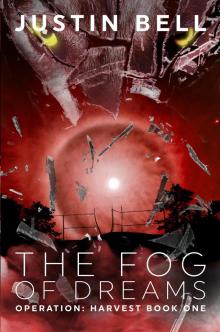 The Fog of Dreams
The Fog of Dreams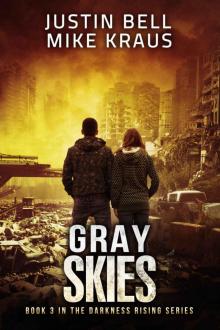 Gray Skies
Gray Skies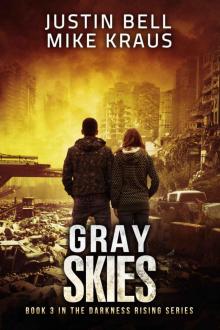 Gray Skies_the Thrilling Post-Apocalyptic Survival Series
Gray Skies_the Thrilling Post-Apocalyptic Survival Series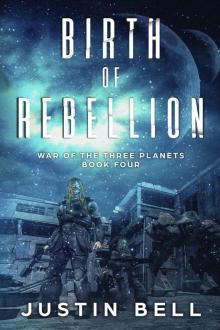 Birth of Rebellion (War of the Three Planets Book 4)
Birth of Rebellion (War of the Three Planets Book 4)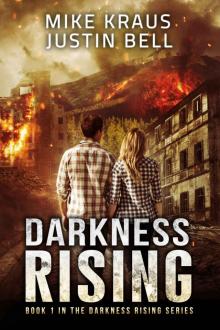 Darkness Rising
Darkness Rising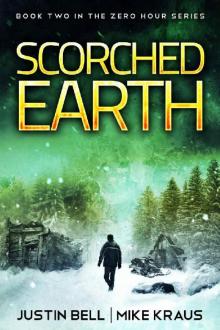 Scorched Earth: Book 2 in the Thrilling Post-Apocalyptic Survival Series: (Zero Hour - Book 2)
Scorched Earth: Book 2 in the Thrilling Post-Apocalyptic Survival Series: (Zero Hour - Book 2)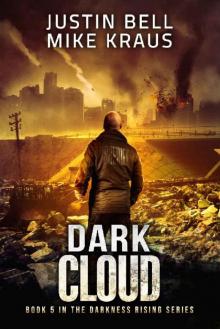 Dark Cloud: Book 5 in the Thrilling Post-Apocalyptic Survival Series: (Darkness Rising - Book 5)
Dark Cloud: Book 5 in the Thrilling Post-Apocalyptic Survival Series: (Darkness Rising - Book 5)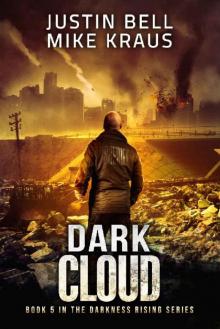 Dark Cloud_Thrilling Post-Apocalyptic Survival Series
Dark Cloud_Thrilling Post-Apocalyptic Survival Series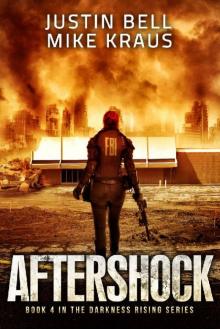 Aftershock: Book 4 in the Thrilling Post-Apocalyptic Survival Series: (Darkness Rising - Book 4)
Aftershock: Book 4 in the Thrilling Post-Apocalyptic Survival Series: (Darkness Rising - Book 4) Aftershock
Aftershock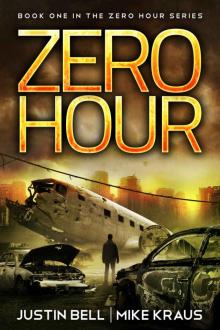 Zero Hour: Book 1 in the Thrilling Post-Apocalyptic Survival Series: (Zero Hour - Book 1)
Zero Hour: Book 1 in the Thrilling Post-Apocalyptic Survival Series: (Zero Hour - Book 1)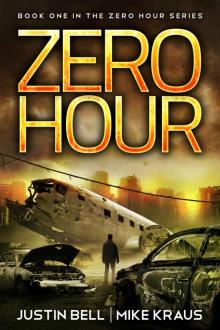 Zero Hour_Thrilling Post-Apocalyptic Survival Series
Zero Hour_Thrilling Post-Apocalyptic Survival Series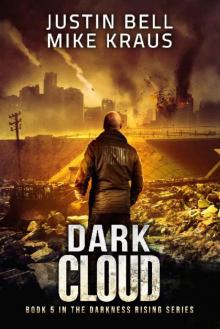 Dark Cloud
Dark Cloud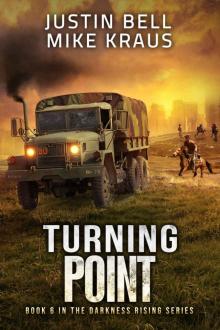 Turning Point: Book 6 in the Thrilling Post-Apocalyptic Survival Series: (Darkness Rising - Book 6)
Turning Point: Book 6 in the Thrilling Post-Apocalyptic Survival Series: (Darkness Rising - Book 6)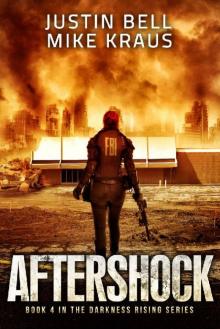 Aftershock_the Thrilling Post-Apocalyptic Survival Series
Aftershock_the Thrilling Post-Apocalyptic Survival Series War of the Three Planets Collection (Book 01)
War of the Three Planets Collection (Book 01)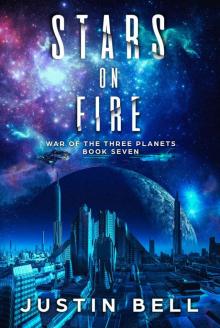 Stars on Fire
Stars on Fire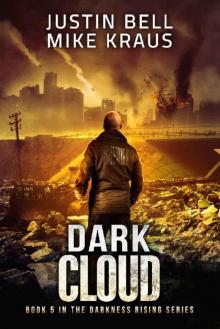 Dark Cloud_the Thrilling Post-Apocalyptic Survival Series
Dark Cloud_the Thrilling Post-Apocalyptic Survival Series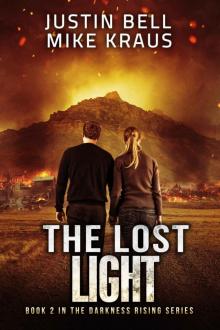 The Lost Light
The Lost Light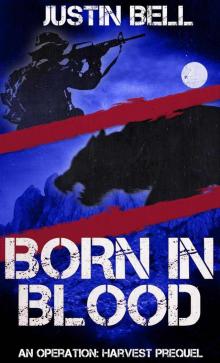 Born in Blood
Born in Blood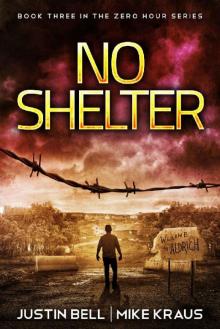 No Shelter: Book 3 in the Thrilling Post-Apocalyptic Survival Series: (Zero Hour - Book 3)
No Shelter: Book 3 in the Thrilling Post-Apocalyptic Survival Series: (Zero Hour - Book 3)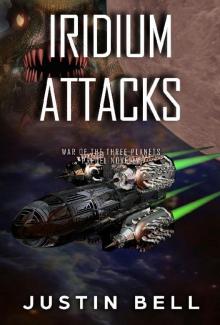 Iridium Attacks
Iridium Attacks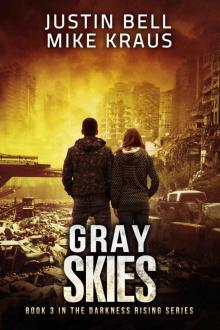 Gray Skies: Book 3 in the Thrilling Post-Apocalyptic Survival Series: (Darkness Rising - Book 3)
Gray Skies: Book 3 in the Thrilling Post-Apocalyptic Survival Series: (Darkness Rising - Book 3)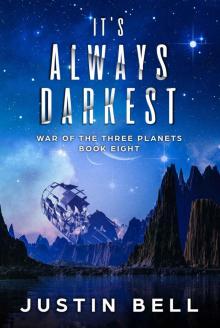 It's Always Darkest
It's Always Darkest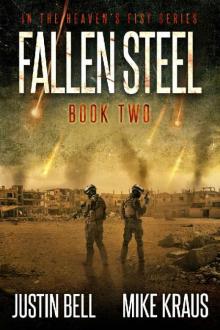 Fallen Steel: Book 2 in the Thrilling Post-Apocalyptic Survival Series: (Heaven's Fist - Book 2)
Fallen Steel: Book 2 in the Thrilling Post-Apocalyptic Survival Series: (Heaven's Fist - Book 2)